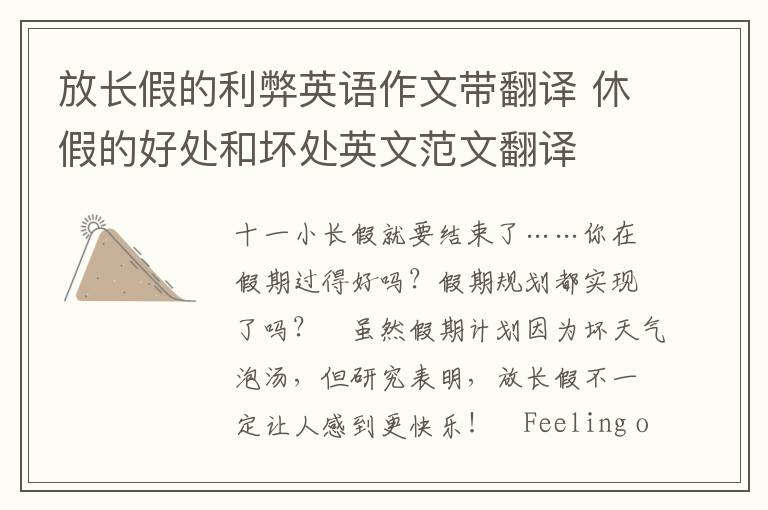
十一小长假就要结束了……你在假期过得好吗?假期规划都实现了吗?
虽然假期计划因为坏天气泡汤,但研究表明,放长假不一定让人感到更快乐!
Feeling overwhelmed by your to-do list can certainly make you unhappy, but new research suggests that more free time might not be the magic elixirmany of us dream it could be.
被一大堆待办事项淹没自然会让人不开心,但是新研究发现,更多空闲时间可能也不是很多人梦想中的万能灵药。
elixir [ɪˈlɪksər]: n. 灵丹妙药;炼金药;长生不老药
假期利用不好,比如没日没夜刷手机、在旅游景点遇上人山人海,有可能会让心情更糟糕。
闲暇是一种积极的、让人身心愉悦的精神状态。如果你不知道如何度过一个下午或者几个小时的空闲时间,可以试试下面这些“万能建议”:
Engaging in a bit of low-key cardio, like walking, can help burn stress. Free-time activities like knitting, reading, cooking or gaming are also known to put people in a state of flow.
有节制地做一些有氧运动,比如步行,能有助于释放压力。织毛衣、阅读、烹饪或玩游戏,在空闲时间做些事也能让你处于活动状态。
有人拼命追求休闲效益最大化
对于假期,人们往往还有一种误解:好不容易才有的假期,我一定要玩个痛快,让每一个小时都有所值。
但事实上,这种努力想要休息好的想法已经开始给你带来了压力。
这种压力体现在我们对每一次休闲娱乐活动的决定中。
“We feel like we want to have the best bang for our buck and minutes. So we invest more money in leisure. Better hotels, better movie experiences – like IMAX or Netflix in 4K – better everything.”
“我们想让我们的金钱和时间得到最好的回报,所以我们在休闲上投入更多的钱。更豪华的酒店、更赞的电影体验,比如IMAX或4K 的Netflix,一切都要升级。”
All this can lead to hours poring over reviews diligently planning leisure activities.
所有这些都可能导致你花好几个小时认真研究点评网站上的评论、规划休闲活动。
美国经济学家丹尼尔·汉默梅什(Daniel Hamermesh)在他的著作《如何度过时间:最宝贵的资源》中提出:
“Our ability to purchase and enjoy goods and services has risen much more rapidly than the amount of time available for us to enjoy them”.
我们购买、享受商品和服务的能力的增长速度远远超出我们享受这些商品和服务的时间。
另外,休闲娱乐消费升级同样也会带来幸福感降级。
对假期的高成本投入不可避免地提高了人们对假期的期望,但是有时过高的期望会让人觉得假期无比短暂。
New research shows that we judge future positive events as both farther away and shorter than negative or neutral ones, leading us to feel like a holiday is over as soon as it begins.
新研究表明与消极或中立事件相比,我们对未来发生的积极事件会作出更长远的预测且感到这些积极事件更短暂,仿佛假期刚刚开始就结束了。
Equally, the way we chase top-notch leisure experiences has made recreation more stressful than ever. High expectations may clash with our experienced reality, making it feel anti-climactic.
同样的,追求一流的休闲体验也让娱乐变得比以往更有压力。过高的期望可能会与我们实际的体验不匹配,让我们感觉休闲活动平淡无奇。
一些人一心想着自己的假期要与众不同、新颖或极端,盲目追求“富有成效的”休闲。
结果往往是让自己成了“打卡机器”,麻木地在“休闲清单”上打勾,而不是简单地去享受当下。
每完成一项,自己的“体验简历”里就增添了一笔夺目的、值得炫耀的资本。
Conspicuous consumption used to be a way for people to display their money through scarce luxury goods. Now, they flaunt how they spend their valuable time only on activities that are truly meaningful, productive or spectacular.
在过去,炫耀性消费是人们通过稀缺的奢侈品来展示自己金钱的一种方式。现在,他们炫耀自己如何只把宝贵的时间花在真正有意义、有成效或引人注目的活动上。
有人偏不爱放假
在一群人想充分享受假期的同时,还有一群人却“舍不得”休息。
For example, only 14% of Americans take two weeks‘ vacation in a row, a finding in keeping with the overwork culture. The same study reports that as of 2017, 54% of American workers didn’t use up their vacation time, leaving 662 million days reserved for leisure unused.
例如,只有14%的美国人会连续休假两周,这一结果符合他们工作过度的文化。该研究报告称,截至2017年,54%的美国员工没有休完他们的假期,剩下6.62亿天空闲时间没有使用。
这种现象实质上反映了一种“休闲=浪费时间”的观念。
Selin A Malkoc, associate professor at The Ohio State University, says certain people perceive leisure as lacking value, even when it doesn’t interfere with their pursuit of goals. These negative beliefs about leisure are associated with lower reported happiness and greater reported depression, anxiety and stress.
俄亥俄州立大学市场营销副教授塞林·A·马尔科克表示,有些人认为休闲缺乏价值,即使休闲并不妨碍他们追求目标。这些对休闲的消极看法与较低的幸福感和较严重的抑郁、焦虑和压力有关。
Malkoc also compared samples from different nations. Participants from India and America, both nations with overwork cultures, endorsed the belief that leisure is wasteful more strongly than participants from France, which has social norms, “less restrictive of enjoying life and having fun”. In fact, while Malkoc estimates about 30% of the population endorses the ‘leisure is wasteful’ belief on average.
马尔科克教授还比较了来自不同国家的样本。来自印度和美国的参与者比来自法国的参与者更认同休闲是一种浪费,这两个国家都有过度工作的文化。法国人遵循的社会规范是“更少地限制娱乐和对生活的享受”。事实上,马尔科克估计大约有30%的人认为休闲是浪费时间。
如何缓解“假期纠结症”?
幸运的是,无论是对于汲汲于享乐效益最大化的人,还是不爱放假的人,都有各自的心理和实际调节的途径。
The first, regardless of which end of the spectrum you fall on, is to relax the productivity mindset. A way to do this is by “assuming a broader perspective on life and anticipating your long-term regrets, as it allows people to enjoy the present more”.
首先,不管你属于哪个极端,放下关于生产力的焦虑心态。要做到这一点,可以“以更广阔的视角看待生活,预见你长远未来中的遗憾,因为这会让人们更享受当下。”
For those seeking to intensify leisure, researchers recommend doing one thing that’s “completely insane” in the middle, such as bungee jumping, and one equally grandiose thing at the end (for instance, a spa day or indulgent meal) to elevate the entire experience and maximise hedonic utility overall.
对于那些想要增强休闲体验的人,研究人员建议在假期中间做一件“完全疯狂”的事情,比如蹦极,在最后做一件同样宏大的事情,比如,水疗日或放纵大吃一顿,以提升假期整体体验,使整体享乐效益最大化。
对于那些一开始就觉得很难抽出时间休息的人,双语君建议你编一套实用的托辞,作为让自己偶尔放松下来、享受生活的借口。
Having a “functional alibi” that articulates a purpose for an activity (such as the health and productivity benefits of taking a much-needed vacation) allows many consumers to relax without feeling guilty.
她说,编一套实用的托辞,阐明某项活动的目的(例如,急需休假有利于身体健康和提高效率),可以让许多休假者放松而不感到内疚。
alibi [ˈælɪˌbaɪ] n.借口;托辞;不在犯罪现场证明
看来,学会享受假期也是一门大学问。
其实,我们无需定义“假期应该是什么样的”“什么样的休闲活动是有益的”。